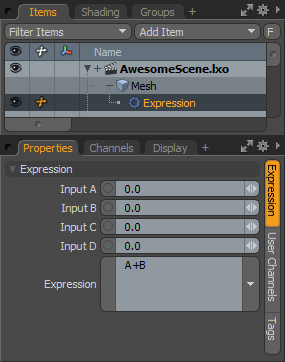 Expression--
Expression--
The 'Expression' channel modifier allows users to use various mathematical and logical operators to define an output value based on the inputs. Expressions are especially useful in creating complex animations that dont require any keyframes, making them are easy to adjust and update. This modifier uses the muParser expression engine.
Input A/B/C/D: User defined input variables. Each is a float value, defined by its variable name- A, B, C or D.
Expression: This is the expression that will be executed based on the defined inputs. For example, "A" would pass the value coming in on the inputA channel to the output channel. "A+B" would add the values coming in on the inputA and inputB channels and set the sum to the output channel. You can also use the built in functions. "sin(A)" would output the sin value of inputA to the output. You also have the option of conditionals. "A>B?C:D" would result in the value in inputC being sent to the output if A is greater then B. If not, the value in inputD is sent to the output.
Output: The output value will be the value returned by the user defined expression string.
User Defined Channels: Any user added channel to the expression node can be used in the expression string. For example, If you add a float channel called, "test", you can then use the name "test" in your expression like "sin(test)"
Built-in Function--
The following table gives an overview of the functions supported by the default implementation. It lists the function names, the number of arguments and a brief description.
| Name | Meaning | |
|---|---|---|
| sin | sine function | |
| cos | cosine function | |
| tan | tangens function | |
| asin | arcus sine function | |
| acos | arcus cosine function | |
| atan | arcus tangens function | |
| sinh | hyperbolic sine function | |
| cosh | hyperbolic cosine | |
| tanh | hyperbolic tangens function | |
| asinh | hyperbolic arcus sine function | |
| acosh | hyperbolic arcus tangens function | |
| atanh | hyperbolic arcur tangens function | |
| log2 | logarithm to the base 2 | |
| log10 | logarithm to the base 10 | |
| log | logarithm to the base 10 | |
| ln | logarithm to base e (2.71828...) | |
| exp | e raised to the power of x | |
| sqrt | square root of a value | |
| sign | sign function -1 if x<0; 1 if x>0 | |
| rint | round to nearest integer | |
| abs | absolute value | |
| min | min of all arguments | |
| max | max of all arguments | |
| sum | sum of all arguments | |
| avg | mean value of all arguments | |
| noise | noise value takes 1..3 aguments | |
| floor(x) | maps x the largest previous integer. i.e. 3.5 becomes 3 | |
| ceil(x) | maps x to the smallest following integer. i.e. 3.5 becomes 4 |
Built-in Binary Operators
The following table lists the default binary operators supported by the parser.
| Operator | Meaning | Priority | |
|---|---|---|---|
| = | assignment * | -1 | |
| && | logical and | 1 | |
| || | logical or | 2 | |
| <= | less or equal | 4 | |
| >= | greater or equal | 4 | |
| != | not equal | 4 | |
| == | equal | 4 | |
| > | greater than | 4 | |
| < | less than | 4 | |
| + | addition | 5 | |
| - | subtraction | 5 | |
| * | multiplication | 6 | |
| / | division | 6 | |
| ^ | raise x to the power of y | 7 |
*The assignment operator is special since it changes one of its arguments and can only by applied to variables.
Other Operators
muParser has built in support for the if/then/else operator. It uses 'lazy' evaluation in order to make sure only the necessary branch of the expression is evaluated.
| Operator | Meaning | Remarks |
| ?: | if then else operator | C/C++ style syntax |


